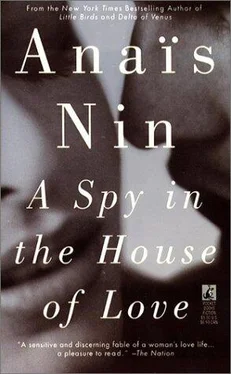At first she beckoned and lured one into her world; then she blurred the passageways, confused all the images, as if to elude detection.
The dawn appearing at the door silenced her. She tightened her cape around her shoulders as if it were the final threat, the greatest enemy of all. To the dawn she would not even address a feverish speech. She stared at it angrily, and left the bar.
The lie detector followed her.
Before she awakened, Sabina’s dark eyes showed the hard light of precious stones through a slit in the eyelids, pure dark green beryl shining, not yet warmed by her feverishness.
Then instantly she was awake, on guard.
She did not awaken gradually, in abandon and trust to the new day. As soon as light or sound registered on her consciousness, danger was in the air and she sat up to meet its thrusts.
Her first expression was one of tension, which was not beauty. Just as anxiety dispersed the strength of the body, it also gave to the face a wavering, tremulous vagueness, which was not beauty, like that of a drawing out of focus.
Slowly what she composed with the new day was her own focus, to bring together body and mind. This was made with an effort, as if all the dissolutions and dispersions of herself the night before were difficult to reassemble. She was like an actress who must compose a face, an attitude to meet the day.
The eyebrow pencil was no mere charcoal emphasis on blond eyebrows, but a design necessary to balance a chaotic asymmetry. Make up and powder were not simply applied to heighten a porcelain texture, to efface the uneven swellings caused by sleep, but to smooth out the sharp furrows designed by nightmares, to reform the contours and blurred surfaces of the cheeks, to erase the contradictions and conflicts which strained the clarity of the face’s lines, disturbing the purity of its forms.
She must redesign the face, smooth the anxious brows, separate the crushed eyelashes, wash off the traces of secret interior tears, accentuate the mouth as upon a canvas, so it will hold its luxuriant smile.
Inner chaos, like those secret volcanoes which suddenly lift the neat furrows of a peacefully ploughed field, awaited behind all disorders of face, hair and costume for a fissure through which to explode.
What she saw in the mirror now was a flushed, clear-eyed face, smiling, smooth, beautiful. The multiple acts of composure and artifice had merely dissolved her anxieties; now that she felt prepared to meet the day, her true beauty, which had been frayed and marred by anxiety, emerged.
She considered her clothes with the same weighing of possible external dangers as she had the new day which had entered through her closed windows and doors.
Believing in the danger which sprang from objects as well as people, which dress, which shoes, which coat demanded less of her panicked heart and body? For a costume was a challenge too, a discipline, a trap which once adopted could influence the actor.
She ended by choosing a dress with a hole in its sleeve. The last time she had worn it she had stood before a restaurant which was too luxurious, too ostentatious, which she was frightened to enter, but instead of saying: “I am afraid to enter here,” she had been able to say: “I can’t enter here with a hole in my sleeve.”
She selected her cape which seemed more protective, more enveloping.
Also the cape held within its folds something of what she imagined was a quality possessed exclusively by man: some dash, some audacity, some swagger of freedom denied to woman.
The toreador’s provocative flings, the medieval horsemen’s floating flag of attack, a sail unfurled in full collision with the wind, the warrior’s shield for his face in battle, all these she experienced when she placed a cape around her shoulder.
A spread-out cape was the bed of nomads, a cape unfurled was the flag of adventure.
Now she was dressed in a costume most appropriate to flights, battles, tournaments.
The curtain of the night’s defenselessness was rising to expose a personage prepared.
Prepared, said the mirror, prepared said the shoes, prepared said the cape.
She stood contemplating herself arrayed for no peaceful or trusting encounter with life.
She was not surprised when she looked out of her window and saw the man who had been following her standing at the corner pretending to be readng a newspaper.
It was not a surprise because it was a materialization of a feeling she had known for many years: that of an Eye watching and following her throughout her life.
She walked along 18th St. towards the river. She walked slightly out of rhythm, like someone not breathing deeply, long steps and inclined forward as if racing.
It was a street completely lined with truck garages. At this hour they were sliding open the heavy iron doors and huge trucks were rolling out, obscuring the sun. Their wheels were as tall as Sabina.
They lined up so close together that she could no longer see the street or the houses across the way. On her right they made a wall of throbbing motors, and giant wheels starting to turn. On her left more doors were opening, more trucks advanced slowly as if to engulf her. They loomed threateningly, inhuman, so high she could not see the drivers.
Sabina felt a shrinking of her whole body, and as she shrank from the noise the trucks seemed to enlarge in her eyes, their scale becoming monstrous, the rolling of their wheels uncontrollable. She felt as a child in an enormous world of menacing giants. She felt her bones fragile in her sandals. She felt brittle and crushable. She felt overwhelmed by danger, by a mechanized evil.
Her feeling of fragility was so strong that she was startled by the appearance of a woman at her left, who walked in step with her. Sabina glanced at her profile and was comforted by her tallness, the assurance of her walk. She too was dressed in black, but walked without terror.
And then she vanished. The mirror had come to an end. Sabina had been confronted with herself, the life size image walking beside the shrunk inner self, proving to her once more the disproportion between her feelings and external truth.
As many other times Sabina had experienced smallness, a sense of gigantic dangers, but she faced in the mirror a tall, strong, mature woman of thirty, equal to her surroundings. In the mirror was the image of what she had become and the image she gave to the world, but her secret inner self could be overwhelmed by a large truck wheel.
It was always at this precise moment of diminished power that the image of her husband Alan appeared. It required a mood of weakness in her, some inner unbalance, some exaggeration in her fears, to summon the image of Alan. He appeared as a fixed point in space. A calm face. A calm bearing. A tallness which made him visible in crowds and which harmonized with her concept of his uniqueness. The image of Alan appeared in her vision like a snap-shot. It did not reach her through tactile memory or any of the senses but the eyes. She did not remember his touch, or his voice. He was a photograph in her mind, with the static pose which characterized him: either standing up above average tallness so that he must carry his head a little bent, and something calm which gave the impression of a kind of benediction. She could not see him playful, smiling, or reckless, or carefree. He would never speak first, assert his mood, likes or dislikes, but wait, as confessors do, to catch first of all the words or the moods of others. It gave him the passive quality of a listener, a reflector. She could not imagine him wanting anything badly (except that she should come home) or taking anything for himself. In the two snap-shots she carried he showed two facets but no contrasts: one listening and waiting, wise and detached, the other sitting in meditation as a spectator.
Читать дальше












